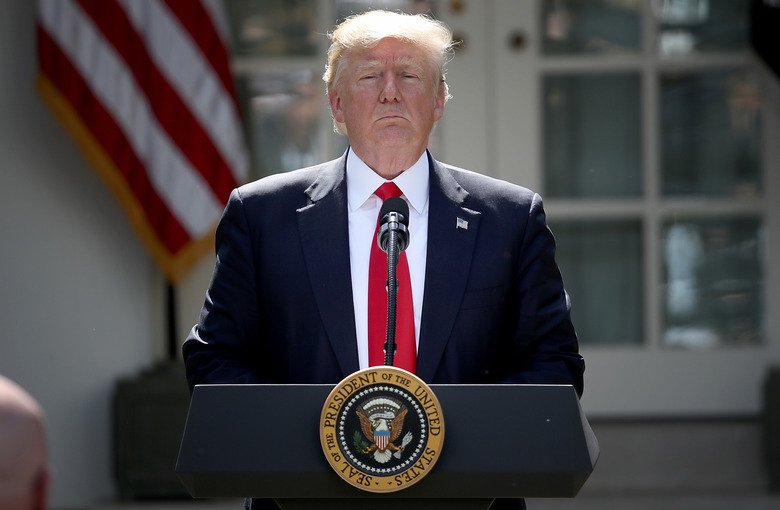President Trump's New White House Climate Panel Includes A Climate Denialist
Big climate news out of the White House this week: President Donald Trump is planning to create a panel to look into whether climate change affects national security, the New York Times reports.
Sounds good, right?
Well, unfortunately, not really.
While the White House's panel is set up to ask whether climate change affects national security, the federal government has already answered: Yes, it does. The U.S. military and intelligence community have been studying how climate change affects national security and have already reported that it poses a risk.
Take this 2014 report from the Pentagon. The report highlights that droughts, food security and extreme weather events can create humanitarian crises worldwide – ones that the U.S. will likely play a role in responding to.
Overall, the report emphasized that military leaders need to be aware of the risks of climate change and how to respond to them. In other words, that we've moved past asking if climate change is an issue for national security and on to asking how to tackle it.
Okay, So Where's the Controversy?
Okay, So Where's the Controversy?
While there remains a scientific consensus that climate change is real and driven in part by human behavior (NASA reports that 97 percent of scientists agree on that) that unfortunately doesn't mean everyone believes in climate change.
And one of the members of President Trump's proposed 12-person panel, William Happer, has been described by the New York Times as a climate denialist. The paper reports that Happer disagrees with the scientific consensus that carbon dioxide – a type of greenhouse gas – harms the planet.
Check out this quote from a 2016 interview with TheBestSchools.org:
_"I believe that more CO2 is good for the world, that the world has been in a CO2 famine for many tens of millions of years and that one or two thousand ppm would be ideal for the biosphere. I am baffled at hysterical attempts to drive CO2 levels below 350 ppm [parts per million], or some other value, apparently chosen by Kabbalah numerology, not science."_
Scientists don't agree. In fact, NASA reports that humans have increased the amount of CO2 in the atmosphere by about one-third since the the Industrial Revolution started, and state "[t]his is the most important long-lived 'forcing' of climate change."
Happer even went a step further in the same interview in his comments about how climate change might impact food security:
_"More CO2 greatly increases the efficiency of photosynthesis in plants and makes land plants more drought-resistant. So, the net result of more CO2 will be strongly beneficial for humanity."_
Again, scientists disagree. As a 2017 NATO Parliamentary Assembly report states, climate change is likely to worsen food and water shortages – not make them better. That same report also points to the national security risks tied to climate change: namely, that climate change could trigger mass migrations with the potential to threaten political stability worldwide.
The Bottom Line
The Bottom Line
The plan to convene the panel seems like another step to question the science on climate change, rather than accepting the risks of climate change as true and working toward possible solutions.
While you can't vote for the members of any climate panel, you can write to your elected representatives to tell them how climate change affects you and demand they work on solutions to address the risk of climate change.
If you've never written to your representatives before, it's likely easier than you think. Check out this handy guide for contacting your representatives about climate change, and make your voice heard!
Cite This Article
MLA
Tremblay, Sylvie. "President Trump's New White House Climate Panel Includes A Climate Denialist" sciencing.com, https://www.sciencing.com/president-trumps-new-white-house-climate-panel-includes-a-climate-denialist-13717411/. 23 February 2019.
APA
Tremblay, Sylvie. (2019, February 23). President Trump's New White House Climate Panel Includes A Climate Denialist. sciencing.com. Retrieved from https://www.sciencing.com/president-trumps-new-white-house-climate-panel-includes-a-climate-denialist-13717411/
Chicago
Tremblay, Sylvie. President Trump's New White House Climate Panel Includes A Climate Denialist last modified March 24, 2022. https://www.sciencing.com/president-trumps-new-white-house-climate-panel-includes-a-climate-denialist-13717411/
